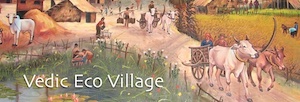Society in Vedic history was a flourishing self-sustaining cow-centric and cow-revered culture. Cows and bulls are an essential contributors to peace and economic prosperity. Sastra tells human society how to live a simple life free from anxiety depending on the cow and bull, the land and the ample supply of natural gifts from the Creator.
To cultivate this culture in our village, Govardhan Goshala hosted Gopuja in a grazing areas on the full moon purnima. The puja featured Surabhi cow and friends who were fed our locally grown foods.
Our desert like summer weather normally begins in June. Everyday we are eating salad and green leafy vegetables from the garden and still carrots from last harvest. A favorite is carrot, beet and parsley juice. New vegetables are harvested every week.
The ox team has been plowing our garden fields in preparation for planting. They are doing the work of 10 ten people preparing the soil for planting. See the "Ox Plowing Garden Fields report" for more details, pictures and videos.
Srila Prabhupada taught us that cow protection and brahminical culture are the keys to real prosperity and that they occur as a natural side effect of following varnasrama dharma.
"From an economic point of view, if one man has a cow and four acres of land he has no economic problems. That we want to start. He can independently live in any part of the world. Simply he must have one cow and four acres of land. So let the people be divided in four acres of land and a cow and there will be no economic question. All the factories will be closed." Srila Prabhupada Conversation with Allen Ginsberg
